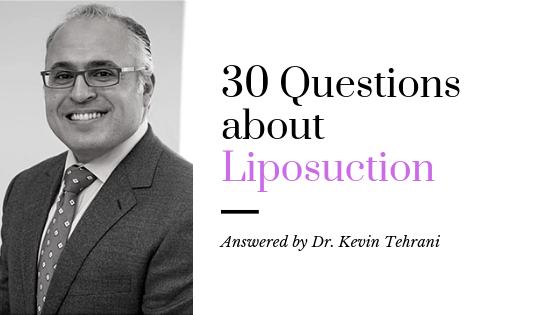30 Questions About Liposuction, Answered by Surgeons (Procedure Costs, Risks, Side Effects, Recovery, Before-After)

Interested in liposuction? Chances are you have a lot of questions on your mind. Here are some of the most important questions we’ve received from our patients, answered by board-certified surgeons. If you don’t find yours here, don’t hesitate to get in touch directly, and we’ll help you out.
General Liposuction Questions
1. What is liposuction?
1. What is liposuction?
Liposuction is a cosmetic procedure designed to remove excess fat of certain problem parts of your body. Liposuction is often performed in combination with other plastic surgery procedures, such as tummy tuck, facelift and breast reduction.
2. How long does liposuction last?
Simple answer: liposuction does remove significant amounts of fat off your body, but +6. If you don’t watch your diet and skip exercises, you’re likely to gain more weight than before the procedure.
3. Can anyone get liposuction?
Simple answer: yes, as long as you’re eligible for the surgery itself. Being within 30% of your ideal weight, having elastic skin and not smoking are among primary criteria. Only after a close examination will your surgeon be able to tell whether you’re eligible for the procedure.
4. Can liposuction get rid of belly fat?
“Get rid” is not exactly the term we’d use here. Liposuction is not considered a weight loss procedure. Instead, fat cells are removed strategically from aesthetically important body areas. Think moderate amounts of fat removed from most visible areas.
5. Does fat come back after liposuction?
Fat cells are permanently removed from your body, and your new shape is permanent. Of course, your body can still generate new fat cells—that’s why exercise and diet are so important after liposuction.
6. Do you lose weight with liposuction?
Yes. However, you shouldn’t consider liposuction a ‘weight loss’ procedure. Liposuction is aimed to improve your appearance by strategically removing fat cells from cosmetically important areas. Removing high amounts of fat cells can be dangerous. For a 150 pound woman, it is realistic to have 4 pounds of fat removed per surgery.
7. Can you gain weight after liposuction?
Yes. Liposuction does not affect your metabolism, so you’ll gain weight at a natural rate. That’s why it’s extremely important to follow up liposuction with proper diet and exercise.
8. How do I prepare my body for liposuction?
A few important things you can do: stop smoking, prepare a training and diet plan, avoid taking aspirin and anti-inflammatory drugs, get lab-tested.
9. Can liposuction reverse diabetes?
No. While liposuction does remove excess fat tissue, it does not affect your metabolism or diabetes in any way. Liposuction does not change insulin resistance or provide any other health benefits for diabetics.
Questions about Liposuction Cost and Insurance
10. How much does liposuction cost in the U.S.?
Prices start with $2,000 and go as high as $8,000. Prices depend on the practice and which part of your body is being operated.
11. How much does liposuction cost outside of the U.S.?
Prices of liposuction across the globe start with $1,000 in South America (Costa Rica, Peru, Mexico) and go as high as $10,000 in Europe (UK, France). Medical tourism outside the U.S. is not recommended.
12. Are there any additional costs to liposuction?
Depending on your clinic, you may have to pay an additional fee for anesthesia, aftercare and other services. Always ask your surgeon what exactly goes into the package.
13. Is liposuction covered by insurance?
Usually, no. Unless liposuction yields some therapeutic benefit (e.g. it is meant to cure subcutaneous lipomas (small tumors)), it won’t be covered by medical or health insurance.
14. Is liposuction covered by Medicare?
Again, usually, no. However, if you believe liposuction could be beneficial for your health condition, contact Medicare directly and see if you’re eligible for financing.
Questions about Liposuction Risks, Side-effects and Recovery
15. Is it dangerous to have liposuction?
15. Is it dangerous to have liposuction?
All surgeries carry some type of risk. During the surgery, you might experience bleeding or a reaction to anesthesia. After the surgery, there might be bumps or other irregularities on your skin where the fat was removed. It is important to thoroughly examine your body and medical history before liposuction.
16. Is it dangerous to have liposuction twice?
You can have the procedure done to the same area several times, however, it is important to give your body at least 6 months to recover. The risk of irregular and uneven results increases with each procedure. Usually, if you don’t achieve the desired result the first time, it is unlikely you will with the repeat surgery.
17. What is the risk of death after liposuction?
The highest risk of severe complications is associated with patients with body-mass indices of 35 kg/m2 and higher. The main risk factors are disproportionately high weight and various heart-related conditions.
18. Can liposuction cause a heart attack?
As far as we know, no. There is no significant evidence that links liposuction to post-op heart attacks.
19. Does liposuction cause blood clots?
In rare cases, liposuction can cause blood clots in the legs. Symptoms of formed blood clots include swelling of the leg, pain, and fever. If you feel any of those symptoms, please contact your surgeon immediately. If blood clots do form, it’s usually 2-10 days after the surgery, however, there is an increased risk for 3 months after the surgery.
20. How long does the swelling last after liposuction?
About 4 weeks. Minor swelling can remain for up to 2 months. To reduce swelling and speed up the healing process, it is recommended to wear compression garments ( for 3 weeks, then 12 hours a day for 3 more weeks), take long walks, avoid intensive exercise, drink lots of water and get lots of rest.
21. Is liposuction surgery painful?
You’ll be under anesthesia during the surgery, so you won’t feel any pain.
22. Is liposuction post-surgery recovery painful?
Yes, it is expected to feel a certain amount of pain after liposuction. The soreness is usually most intense during the first 2-4 days after the surgery. The pain gradually goes away after 4-8 weeks.
23. Does liposuction leave scars?
Liposuction will leave a minor scar that will fade away with time. There may be no scar at all. This is nowhere close to the long, visible and lasting scars that a tummy tuck procedure might leave.
24. Can you take ibuprofen after liposuction?
Not recommended. Patients should avoid taking pain-reducing medicine such as ibuprofen, aspirin, Motrin, Advil or Aleve for the first two weeks after the surgery. These can increase the damage and the bruising and slow down the healing process significantly.
Before and After Liposuction (Stories and Photos
Take a look at some of the liposuction procedure results performed here at Aristocrat Plastic Surgery here: https://www.aristocratps.com/photo-gallery/liposuction/#gallery
Other Liposuction Questions
25. Ultrasonic liposuction cavitation slimming machines. Do they work?
25. Ultrasonic liposuction cavitation slimming machines. Do they work?
They do, to a degree. While the amount of fat removed may be similar, the effect on your appearance is nothing like an actual liposuction. During liposuction, the fat isn’t just removed randomly—it’s extracted strategically from highly targeted areas so that the fat removal provides the best aesthetic results.
26. Are there any good alternatives to liposuction?
Among surgical procedures, you might be interested in laser-assisted liposuction and ultrasonic-assisted liposuction. These procedures are more advanced than traditional liposuction and extract fat less traumatically.
For non-surgical measures, check out mesotherapy. During the procedure, a fat-disrupting chemical will be injected into a targeted body area. However, this procedure usually turns out to be more expensive and less effective, and their results take months to show, whereas a traditional liposuction can grant results within 1-2 weeks.
Other alternatives include laser lipolysis (external laser light), different types of fat cells in your body, so depending on which particular type of fat is being removed during the surgery, you might have more or less loose skin after liposuction. The elasticity of your skin also comes into play.
The general case is that liposuction causes the skin to contract to cover the new tissue (after removal of fat, there is actually more “surface” on your body than before, so the skin comes in handy.) So, more often than not, the skin is likely to actually be tighter after the surgery. It helps to think of liposuction as ‘sculpting’ your body, rather than ‘shrinking’ it.
Loose skin is also more common with repeat liposuction procedures.
29. Can liposuction lower my dress size?
Yes, but it depends.
Liposuction is a procedure that targets problematic areas with lots of concentrated fat. During the surgery, you don’t just ‘drain’ the fat out evenly throughout all body parts—you target a specific area (belly, thigh, chest, etc.) and remove fat from that specific area.
That’s why not all patients are good candidates for liposuction. For example, if you have particularly wide hips and a narrow waist, then liposuction could produce significant results, and you could probably wear clothes a few sizes down. If the fat is evenly distributed across your body, then liposuction might not be a good option for you in the first place.
30. Liposuction before pregnancy. Safe? Worth it?
Safety: liposuction does not present any threat to your pregnancy.
Practicality: whether it’s worth getting the surgery before your pregnancy depends more on whether liposuction is a good choice for you in the first place.
If you have concentrated pockets of fat that could be effectively targeted with liposuction, then it’s a good idea to go under the knife, whether before or after the pregnancy. After the surgery, those fat cells are gone for good, so there’s no need to worry that it will come back after your pregnancy.
What can happen is that new pockets of fat can form after your pregnancy. But that would require a separate surgery and a separate decision.
So, the most honest answer to this question is: it doesn’t matter. Liposuction targets one problem area at a time, and the fat you remove will never return. If you’re a good liposuction candidate, you can go ahead and have the surgery before your pregnancy—it won’t ‘undo’ the effects of liposuction.
Bonus Question: Can ‘non-surgical liposuction’ achieve the same results as liposuction?
Simple answer: no.
First of all, liposuction is a surgical procedure. Other methods that are aimed to reduce fat—external ultrasound, RF treatments, Endermologie, and lipo-dissolve—are not the same as liposuction.
But what you care about is the result, and the result usually differs dramatically between non-surgical and surgical approaches. The only real way to get rid of fat is to remove it—non-surgical means merely try to redistribute the fat to achieve better optics.
However, this leads to another issue: the whole point of liposuction is to remove fat from a problem area in a highly targeted and focused way. Once again, liposuction isn’t just about removing the fat—it is about ‘sculpting’ your body to achieve the desired appearance.
If you’re determined to try out an alternative non-surgical fat ‘removal’ method, feel free to do so at your own risk. The worst that can happen (besides any health complications) is that you don’t achieve the desired look, which leaves you in a position to try out real liposuction.

